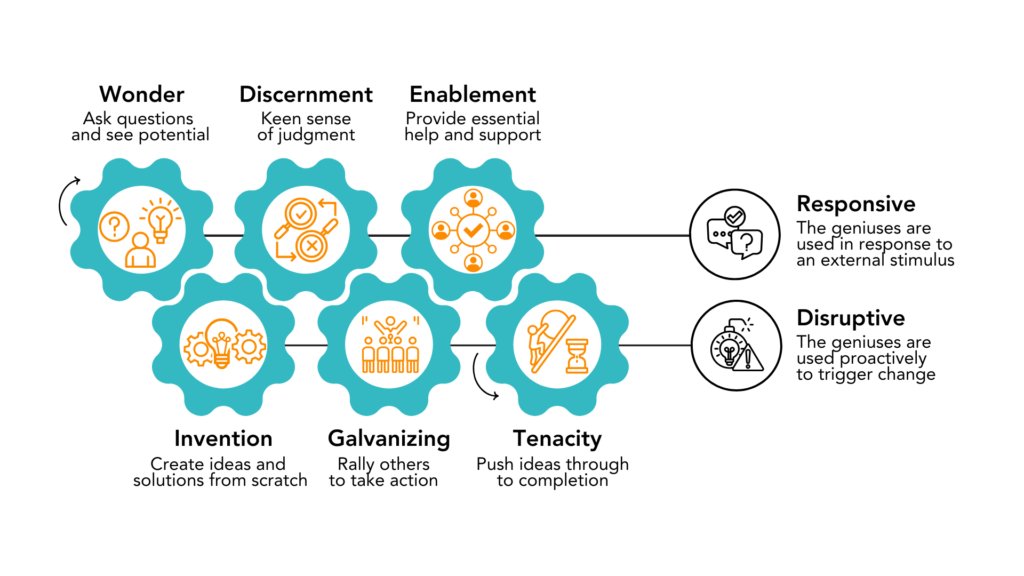The cornerstone of success
In modern business, collaboration is the cornerstone of success. As organisations navigate increasingly complex challenges and opportunities, the traditional siloed approach to teamwork is giving way to a more integrated and collaborative model. This is an era of cross-functional genius teams, dynamic groups composed of individuals from diverse backgrounds, skill sets, and areas of expertise. This article explores the undeniable benefits of cross-functional genius teams and why they are superior to their siloed counterparts.
¨”If you want to go fast, go alone,
if you want to go far, go together.”
– African Proverb
Every leader wants to utilize the full power of their organization. Teams that collaborate well always win over teams that don’t. However, not many leaders provide systems for great collaborations. Unfortunately, a lack of great collaboration systems can even lead to the opposite of collaboration: competition! Leaders or teams that compete against each other instead of collaborating. Where there is internal competition, there is no Ubuntu.
Ubuntu describes a set of closely related African-origin value systems
that emphasize individuals’ interconnectedness with their surrounding societal and physical worlds.
“Ubuntu” is sometimes translated as “I am because we are” or “humanity towards others.”
Competition within an organization leads to a zero-sum game where there is a winner and a loser. In a zero-sum game, the gains of one individual or group come at the expense of others, creating a divisive atmosphere and hindering overall progress. Instead, fostering a culture of cooperation among leaders and teams can lead to win-win or, even better, happy-happy outcomes, where everyone benefits and works towards common goals.
Internal competition should be discouraged because it hinders good cooperation, which is essential for success in a rapidly changing world. This can be done by clarifying the purpose, the vision and the pathway towards the vision using the BIG Framework Start with why model. The only competition you as a leader should encourage is how your team can repeatedly win over your external competitors. To do this, you must use the full power of your organization by embracing a Better Together mindset.
Teams that work well together perform better
Reflection:
Is there a “better together” mindset within your organisation?
How can you build a “better together culture”?
Leaders in today’s disruptive world must understand the importance of collaborations that create synergies for their organizations. This can only be accomplished when leaders genuinely believe that the sum of a team is always better than the sum of the individuals. This requires a better together mindset that always looks at optimizing the whole, not isolated parts. But how?
Breaking down silos
In many organizations, departments operate in isolation, with little communication or collaboration between them. This siloed structure can hinder innovation, suffocate creativity, and hinder progress. Siloed teams tend to focus narrowly on their own tasks and priorities, often overlooking the bigger picture and missing out on valuable opportunities for synergy and collaboration. Optimizing the whole, not isolated parts, requires working in cross-functional genius teams that can deliver impact, not just tasks.
Build teams that can deliver impact not just tasks
Harnessing diversity and expertise
Cross-functional teams bring together individuals with a wide range of perspectives, experiences, and expertise. By leveraging this diversity, cross-functional teams are better equipped to tackle complex challenges and find innovative solutions. Each team member brings a unique set of skills and knowledge to the table, contributing to a more robust and comprehensive approach to problem-solving. When building any team at any level of your organisation, you should always look at what impact the team is expected to deliver, given the vision of your aim. Also, considering each member’s working genius is a very important part of propelling your teams to deliver impact with higher-quality job satisfaction because every person uses their strongest passions and talents.
The best teams are built around the business impact they are expected to deliver
Enhancing Communication and Collaboration
Effective communication is essential for success in any organization. Cross-functional teams promote communication and collaboration across departments and functional areas, breaking down silos and fostering a culture of teamwork and cooperation. By working closely together, team members develop a shared understanding of goals and objectives, leading to greater alignment and synergy.
Encouraging creativity and innovation
In a cross-functional team, blending different perspectives and skill sets sparks creativity and drives innovation. By breaking down traditional barriers and fostering open communication, cross-functional teams create an environment where new ideas can flourish and novel approaches can be explored. This culture of innovation enables organisations to stay ahead of the curve and adapt to changing market conditions more effectively.
Improving decision-making and problem-solving
Well-assembled Cross-functional genius teams are well-positioned to make informed decisions and solve complex problems quickly and efficiently from A to Z without having many dependencies outside the team.
Driving results and achieving success
Ultimately, the accurate measure of a team’s effectiveness is its ability to deliver results with a real impact. Cross-functional genius teams consistently outperform their siloed counterparts in terms of productivity, efficiency, and innovation. By harnessing team members’ collective talents and expertise, cross-functional teams are better equipped to overcome challenges, seize opportunities, and achieve success.
Leveraging working genius
In addition to diversity and collaboration, the concept of “working genius” is integral to the success of cross-functional teams. Working genius refers to the unique strengths and capabilities that individuals bring to the table. By understanding each team member’s working genius, organisations can ensure that individuals are placed in roles where they can thrive and make meaningful contributions. This approach not only maximises the potential of each team member but also enhances overall team performance. There are 6 working geniuses required to accomplish any work. Everyone considers specific work joyful and fun or energy-draining and boring. Matching your people with work they experience joyful and fun will help you deliver better outcomes.

Key takeaways
In conclusion, the evidence is clear: we are better together. Cross-functional genius teams offer a superior alternative to traditional siloed teams, leveraging diversity, expertise, collaboration, and working genius to drive innovation, creativity, and results. As organisations strive to adapt to an increasingly complex and competitive business landscape, the importance of cross-functional genius teams cannot be overstated. By embracing the power of collaboration, teamwork, and working genius, organisations can unlock new opportunities for growth, innovation, and success.
Do you want to learn how to build cross-functional genius teams
that deliver better together?


